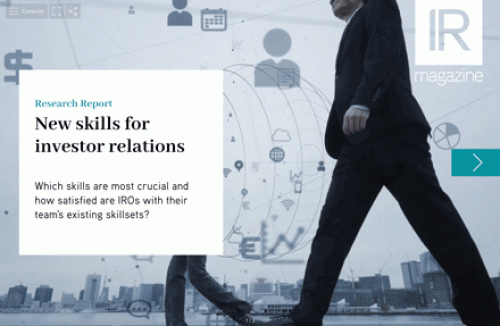In 2001, Deb Kelly received the second ever lifetime achievement award from IR Magazine – hot on the heels of Lou Thompson – something she cites as one of the highlights of a long career.
Now 22 years later, in the run-up to the IR Magazine Forum – Women in IR on April 27, Kelly, a partner at Denver, Colorado-based strategic communications firm Genesis, reflects on what IR was like in the 1970s, why mentoring is so important and the enduring skills all successful IROs need.
Positive discrimination
Kelly got started in investor relations at a time when IR itself was just getting started, having worked for a bank in New York before moving to Boston – in part ‘to be closer to the skiing’.
‘I was a securities analyst in the 1970s in Boston,’ she explains. ‘And I was hired as a securities analyst because banks were being pressured at that time to have women in jobs of some professionalism. I didn’t know anything about securities analysis, but I did learn and [the bank] offered to pay for courses.’
Kelly’s work on the buy side eventually led to her becoming the first IR representative at Lowe’s Companies, followed by other Fortune 500 firms, including a 10-year stint leading the IR team at The Quaker Oats Co. She served on the NIRI board of directors, chaired the original NIRI task force on disclosure issues and served as president of the body’s Rocky Mountain chapter. Kelly has been a member of the board of directors of Perdue Farms since 1996 and is now chair of its governance committee.

An interest in regulation led to a meeting with SEC chief accountant John Burton, a position leading IR for New York City – at a time of financial crisis for the city – and a place on the blue-ribbon SEC Advisory Committee on Corporate Disclosure in the late 1970s alongside the likes of Warren Buffett.
‘They were the captains of law, accounting and so on. And I was the woman on the committee – and very young at the time,’ Kelly recalls.
Describing herself as ‘part of a cohort that was given a bit of special treatment originally’, Kelly says she is ‘generally in favor of affirmative action’ when asked her views on quotas. Offering what she describes as ‘not a simple answer to a complex question’, she says: ’I think when one is young and earlier in a career, it doesn’t matter much [if you are chosen to fill a quota] – later, I think most people would prefer to be selected based on merit rather than quotas.’
Multiple mentors
While quotas might work to get the collective female foot in the door, where Kelly sees huge potential is in mentoring.
‘It’s really important for women to have multiple mentors, because they can ask questions about a situation and get different points of view on how to handle it – in a way that feels comfortable to them,’ she points out.
Kelly notes that, as a generalization, women tend not to ‘beat their chests’ quite as much as men, but that doesn’t mean they should try to change. Her approach to mentoring is about helping women manage their careers in a way that feels true to them.
While Kelly talks about the benefits of mentoring for women, she cites networking more broadly as essential to any IR career: ‘Networking and getting to know people. Finding out what issues they’re dealing with and getting involved. Those things served me very, very well. It’s such a basic thing [but] there have been a lot of people who’ve been really helpful to me over the years, just because I was networking.’
Here come the CFOs
Despite the issues that might come to mind when we think about being a woman in finance – or just a woman anywhere – in the 1970s, Kelly says the biggest challenges of her career have reassuringly been very much about IR.
‘The biggest challenge I faced was convincing management teams to be transparent,’ she says. ‘Sometimes management has a tendency to want to tell the story only when it’s good, and that can be hard to overcome. It’s an art that the best IR practitioners are really good at.’
Interestingly, the other key challenge Kelly talks about relates to how IR grew in importance over the years.
‘When I started, IR was unique,’ she says. ‘And CFOs really weren’t involved in it very much. Of course, that has changed pretty dramatically. I think IROs did have more of a free reign before. The investor relations professional is the expert on the markets’ view. You know how to tell the company story, you’re the one talking to investors on a regular basis.

‘And I think when CFOs realized how important IR was, and how important it was to the board and the CEO, they understandably wanted ownership of that. To me, at the time, that was a bit of a setback in terms of having a seat at the table.’
Still, at those companies that really make the most of their IR, that executive seat remains at the table.
Today, with a 35-year career already behind her, Kelly is focused on the marketing side of company communications, though she says she still offers IR advice when a client needs it.
So what’s the secret to Kelly’s longevity? If her thoughts on what an IRO needs for success is anything to go by, then a natural desire to learn and people skills are vital.
‘Learning a new business is so interesting,’ she says. ‘Having that intellectual curiosity is really helpful, as are good people skills.’
Our seventh annual IR Magazine Forum – Women in IR returns to New York on April 27 – click for more details and to book your place










